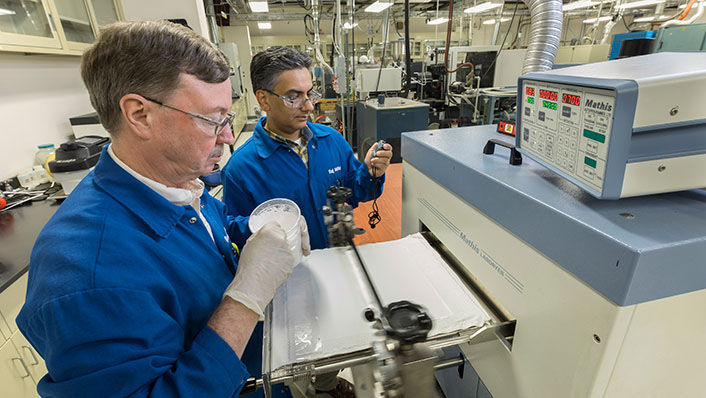Integrated Operations Produce Top-Tier Raw Materials

As the complexity of active pharmaceutical ingredient (API) has increased, so has the raw material supply chain. Drug manufacturers must ensure that these materials meet strict regulatory guidelines regarding impurity levels, that their quality is well documented to mitigate risk, and that they can be traced throughout the supply chain. An integrated supply chain, with transparency among sponsors and suppliers, ensures that regulatory starting materials (RSMs) are well characterized and free of impurities that can impact the final drug product.
Simplified RSMs and API manufacturing processes
Grace’s Fine Chemical Manufacturing Services (FCMS) manufactures APIs for a range of custom and generic products. We produce high-quality APIs that meet and surpass the updated regulations regarding impurities — including heavy metals and genotoxic compounds. Our production success is a result of our robust R&D, analytical services, engineering, and quality teams, who collaborate to design and implement process optimizations that will improve API quality. We support these teams through integrated operations between our cGMP manufacturing facility that produces APIs and our ISO fine chemical facility that produces many of the RSMs used to make our APIs. This integration offers unparalleled transparency into our RSM manufacturing processes, simplifies the supply chain, and allows us to identify and control impurities earlier in the API manufacturing process.
Grace FCMS’s FDA-registered cGMP site in South Haven, Michigan produces more than 40 products, from custom APIs and advanced intermediates to a family of generics. Our custom manufacturing facility in Tyrone, Pennsylvania routinely handles highly hazardous materials, such as chlorine, anhydrous ammonia, thionyl chloride, and N-butyl lithium. Tyrone supplies RSMs ranging from small pilot (10 kg) to commercial (100 metric tons) quantities.
Controlling impurities through fine chemistry and collaboration
As materials and compounds become more complex, and the chemistries required to synthesize them become more advanced, regulations regarding identification, characterization, and control of residual impurities also have become more stringent. The integration of the Tyrone and South Haven operations makes Grace FCMS one of the most capable and flexible broad-based chemistry operations in North America. Grace FCMS’s integrated supply chain excels at meeting these ever-higher standards in the APIs we produce for our clients.
Grace FCMS’s cores strengths in analysis and R&D at both sites allow us to collaborate with clients on process development. We continuously develop and refine our analytical methods to identify impurities more precisely and determine the optimal upstream and/or downstream process modifications to control, minimize, or eliminate them. The quality of incoming RSMs from the Tyrone site is tightly controlled through predetermined acceptance criteria, and our integration between the two sites helps to quickly address any deviations from those criteria. When a deeper investigation is required, the two sites collaborate to determine the root cause and make prompt corrections.
Regulatory agencies expect manufacturers to understand fully the processes used to produce the RSMs used in their drug substances. However, total transparency is often difficult or even impossible with an external supplier. Grace FCMS’s site integration provides optimal transparency. For example, when the Tyrone facility considers process optimizations for an RSM, teams at both sites evaluate the impact of those changes to determine the appropriate testing for process approval. This ensures a complete understanding of the impact process changes has on the final API.
Anticipating safety, forecasting, and compliance challenges
Once we have determined the chemistry for a given API, we begin process development at both sites, with safety and quality always our primary concerns. Sometimes alternative chemistries are required to ensure a robust process that is safely designed. It is important to address these issues early, before scale-up, because changing chemistry for safety becomes more challenging and costly as a new API approaches validation.
Speed to market is almost always a top priority for clients, and our integrated supply chain makes it easier to forecast production schedules and expedite our clients’ time to market. The teams at both sites collaborate to identify opportunities for improvement, set production schedules, and address logistical issues. Our clear understanding of capabilities and chemistries at both facilities allows us to design integrated solutions for supply chain security, impurity identification, method development, process development, scale-up, and regulatory compliance. The teams can adapt quickly to changes in customer demand, and work with clients to ensure successful and timely delivery of the API.
Site integration and collaboration are especially beneficial to sponsors fast-tracking a product to market, wherein everything moves on a compressed timeline. Here it is even more critical to make the most informed choices and prepare for contingencies from the start. Both sites coordinate to discuss a fast-track filing and make rapid adjustments as quickly as possible. Site integration avoids the process delays sponsors would incur by sending out data and waiting for feedback.
Regardless of the approval pathway, a product approved in the United States is not automatically approved in Europe, as was common in the past. Our analytical and R&D expertise, and analytical equipment, allow us to anticipate these potential gaps and respond quickly. Our regulatory teams work with customers to develop processes and methods to ensure the compliance and quality of their APIs because their products are as important to us as they are to them.